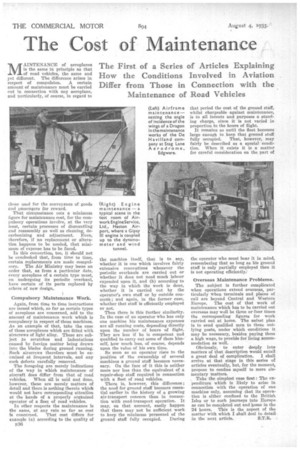The Cost of Maintenance
Page 46

If you've noticed an error in this article please click here to report it so we can fix it.
mAINTENANCE of aeroplanes is the same in principle as that of road vehicles, the same and yet different. The difference arises in respect of compulsion. A certain amount of maintenance must be carried out in connection with any aeroplane, and particularly, of course, in regard to
those used for the conveyance of goods and passengers for reward.
That circumstance sets a minimum figure for maintenance cost, for the compulsory operations involve, at the very least, certain] processes of dismantling and reassembly as well as cleaning, decarbonizing and adjustment. Even, therefore, if no replacement or alteration happens to be needed, that minimum of expense has to be faced.
In this connection, too, it should not be overlooked that, from time to time, certain replacements are made compulsory. The Air Ministry may issue an order that, as from a particular date, every aeroplane of a certain type must, on undergoing its periodic overhaul, have certain of its parts replaced by others of new design.
Compulsory Maintenance Work.
Again, from time to time instructions are issued which, so far as certain types of aeroplane are concerned, add to the amount of maintenance work which is compulsory in respect of those machines. As an example of that, take the case of those aeroplanes which are fitted with airscrews of light alloy. These are subject ..to scratches and indentations caused by foreign matter being drawn into the blades during ground running. Such airscrews therefore must be examined at frequent intervals, and any such defects carefully removed.
The foregoing are merely indications of the way in which maintenance of aircraft does differ from that of road vehicles. When all is said and done, however, these are merely matters of detail and there is nothing therein which would not have corresponding attention at the hands of a properly organized operator of a fleet of road vehicles.
In other respects the maintenance is the same, at any rate so far as cost is concerned. That cost differs for example (a) according to the quality of n36 the machine itself, that is to say, whether it is one which involves fairly extensive renovations whenever the periodic overhauls are carried out or whether it does not need much labour expended upon it, and (b) according to the way in which the work is done, whether it is carried out by the operator's own staff or by outside concerifs ; and again, in the former case, whether that staff is efficiently employed or not.
Then there is this further similarity. In the case of an operator who has only one machine his maintenance expenses are all running costs, depending directly upon the number of hours of flight. They are less if he is competent and qualified to carry out some of them himself, how much less, of course, depends upon the value of his own time.
So soon as an operator rises to the position of the ownership of several machines a ground staff becomes necessary. On the face of it this is neither more nor less than the equivalent of a repair-shop staff required in connection with a fleet of road vehicles.
There is, however, this difference ; the need for ground staff becomes essential earlier in the history of a growing air-transport concern than in connection with road-transport operation. It may, on that account, easily happen that there may not be sufficient work to keep the minimum personnel of the ground staff fully occupied. During
that period the cost of the ground staff, whilst chargeable against maintenance, is to all intents and purposes EL standing charge, since it is not varied in proportion to the hours of flight.
It remains so until the fleet becomes large enough to keep that ground staff fully occupied. That, however, may fairly be described as a special condition. When it exists it is a matter for careful consideration on the part of the operator who must bear it in mind, remembering that so long as his ground staff is only partially employed then it is not operating efficiently.'
Overseas Maintenance Problems.
The subject is further complicated when operations extend overseas, particularly when terminals and places of call are beyond Central and Western Europe. The cost of that work of maintenance which has to be carried out overseas may well be three or four times the corresponding figures for work carried out at home. The safest plan is to send qualified men to these outlying posts, under which conditions it may be necessary, besides paying them a high wage, to provide for living accommodation as well.
Obviously, to enter deeply into matters of that description would entail a great deal of complication. I shall arrive at that stage in this series oE articles eventually, but, for the moment, propose to confine myself to more elementary matters.
Take the simplest case first: The expenditure which is likely to arise in connection with the operation of one machine only, assuming that its operation is either confined to the British Isles or to such journeys into Europe as can be completed out and home in the 24 hours. This is the aspect of the matter with which I shall deal in detail
in the next article. S.T.R.




















































































